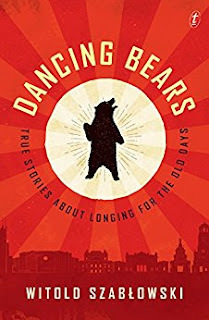Stephanie Jane reviewed Dancing Bears by Antonia Lloyd-Jones
A thought-provoking investigation
4 stars
A Twitter discussion I spotted about the ethics of farming cows for their milk reminded me of this book I read back in 2018. The arguments put forward on Twitter in favour of dairy farming were couched in the same language and attitudes as the former bear keepers used when speaking to Witold Szablowski. This book is in two halves, the first of which tells of the last few Bulgarian Roma families to own dancing bears. Szablowski spent time talking with these families about how they kept and trained their bears, how they were fed and cared for. He also spoke with the Australian Four Paws charity which was committed to rescuing the bears and now provides them with a safe home and the illusion of freedom. Having been captives for practically all their lives, none of the bears would survive absolute freedom in the wild. What is particularly saddening …
A Twitter discussion I spotted about the ethics of farming cows for their milk reminded me of this book I read back in 2018. The arguments put forward on Twitter in favour of dairy farming were couched in the same language and attitudes as the former bear keepers used when speaking to Witold Szablowski. This book is in two halves, the first of which tells of the last few Bulgarian Roma families to own dancing bears. Szablowski spent time talking with these families about how they kept and trained their bears, how they were fed and cared for. He also spoke with the Australian Four Paws charity which was committed to rescuing the bears and now provides them with a safe home and the illusion of freedom. Having been captives for practically all their lives, none of the bears would survive absolute freedom in the wild. What is particularly saddening though is that some are so institutionalised that even the small semblance of liberty can be too much to cope with. Sometimes it seems as though those bears would rather return to the pain of nose rings and beatings but with the security of the life they knew. Learning how to fend for themselves is just too bewildering. Szablowski noticed a similar trait in some human groups who had been ruled by communism for decades. He likens their experiences and nostalgia to that of the bears and, in the second half of the book, travels to various Eastern European countries to listen to people reminisce about the good life they no longer have. What was surprising for me was that these aren't people who did particularly well financially under communism, but those who, like the bears, felt a level of security and social responsibility that is now actively discouraged under the greedy capitalist system. Farms which once employed and fed whole communities now might only employ a half dozen men and the food is sold elsewhere for a profit. Towns that once thrived are now all but abandoned because the jobs are all in the cities. It is fortunate that Szablowski has a good way of imparting humour and a keen eye for the absurd otherwise Dancing Bears could have been a very depressing book. Instead it is a fairly light read, but one with a deeper, thoughtful side. Although the extreme version of communism was not a pleasant system to be ruled by and I certainly don't advocate the return of animal torture for entertainment, is our continuing rush to extreme Western capitalism really the best way for our societies to live either? I could understand the longing of these people for a past that might not have actually existed in quite the way they remember, but that desire for sense of security and belonging is universal and very real. Unfortunately it is also easily played upon by men with 'wacky hairstyles' the world over to lead us into something that won't turn out to be what we thought we would get at all.

